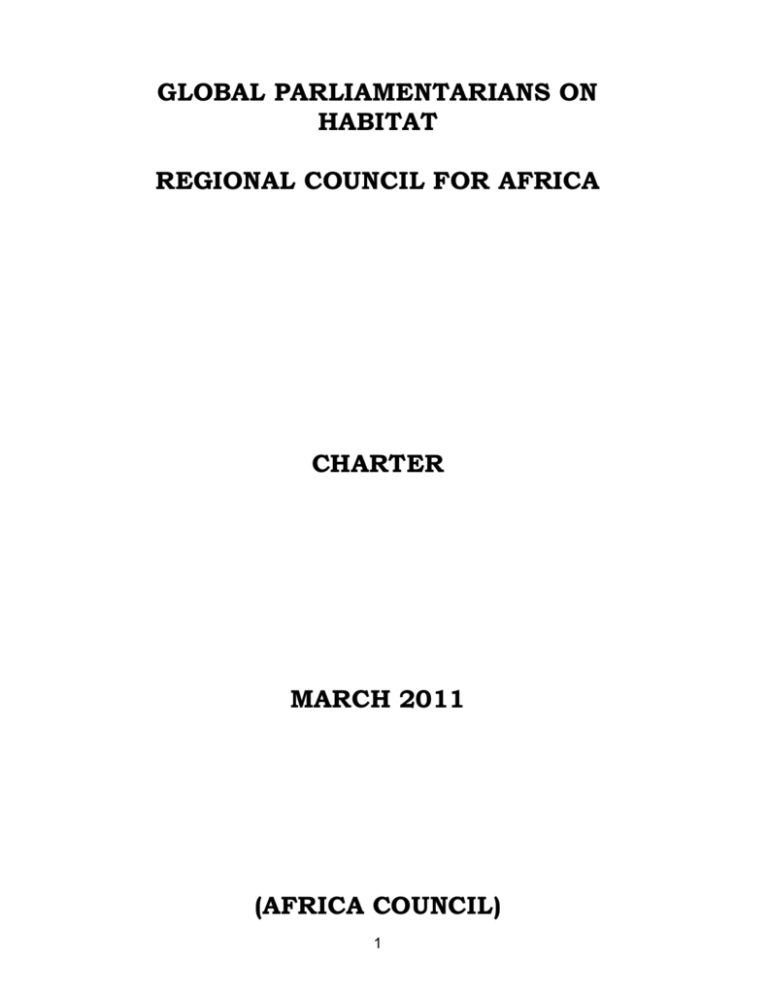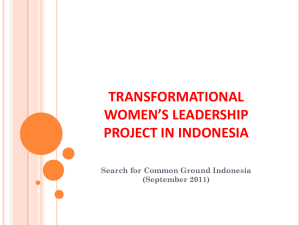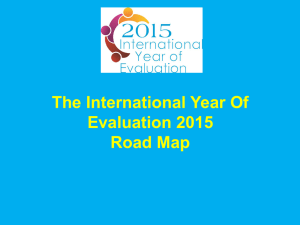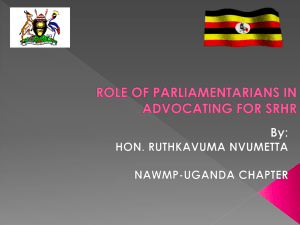BY-LAWS OF THE GLOBAL PARLIAMENTARIANS ON HABITAT
advertisement

GLOBAL PARLIAMENTARIANS ON HABITAT REGIONAL COUNCIL FOR AFRICA CHARTER MARCH 2011 (AFRICA COUNCIL) 1 PREAMBLE. Aware of the commitment by UN-HABITAT in building the capacity of member states towards addressing challenges and promoting solutions for sustainable development; Recognizing that more than 75 percent of the Africa’s population have little or no access to land, adequate and affordable shelter, water, sanitation and proper waster management and basic services or infrastructure - resulting in inhuman living conditions; Affirm that all men and women have equal rights to live with dignity, without discrimination yet lack of proper planning and poor governance coupled with high population growth, land scarcity and rapid urbanization has precipitated poor housing; slums; rise in crime, conflict, corruption, increased public health problems, and poverty; Acknowledging that without proper legislation and planning including budgetary allocations that address housing, land, environment, water, health, sanitation and human settlements, there can be no economic growth and development; Recognizing that the laws, policies and public institutions that deal with human settlement must undergo radical reform and transformation in order to deliver sustainable development through legal frameworks which empower citizens in resolving citizens in resolving problems relating to land, housing, urban planning and poverty alleviation; Considering that Parliaments in Africa are vital institutions in promoting good governance and in particular parliamentarians are mandated to legislate laws that protect the rights of the electorate and hold their Governments accountable on all matters including sustainable development; Reaffirming that Parliamentarians are responsible for formulation of policy and legislation that establishes proper urban planning and management, urban governance and protection of basic human rights; Recognizing that there is need to strengthen partnership between Parliamentarians in Africa and UN-HABITAT for the purpose of training and building the capacity of legislators and relevant parliamentary committees on legislation and best practice in the field of sustainable urban development; We the members of the Africa Council of Global Parliamentarians on Habitat dedicate ourselves to advocacy of effective legal and policy frameworks, compliance with international obligations, allocation of budgetary resources, awareness raising and information sharing on critical issues regarding sustainable urban development. 2 ARRANGEMENT OF CHAPTERS I. II. III. IV. V. VI. VII. VIII. IX. X. General Provisions Membership Structure of the AFRICA COUNCIL General Assembly Executive Committee Permanent, Ad hoc & Special Committees Former Parliamentarians Committee Technical Secretary Secretary-General Savings and Interpretation 3 CHAPTER I GENERAL PROVISIONS Article1. The Official name of this organization shall be THE GLOBAL PARLIAMENTARIANS FOR HABITAT REGIONAL COUNCIL FOR AFRICA, hereafter referred to as the AFRICA COUNCIL. OFFICE LOCATION Article 2. The permanent central office of the AFRICA COUNCIL shall be established at the official address of the President of the Executive Committee in turn or any other at any other place as may be established by the Executive Committee. National Country Groups may establish offices with the approval of the Executive Committee. NATURE OF THE ORGANIZATION Article 4. The AFRICA COUNCIL is a regional sub-organization, being the regional council for Africa for the Global Parliamentarians on Habitat (GPH). The AFRICA COUNCIL is composed of current and former legislators, country chapters and individuals from Africa whose activities contribute to the accomplishment of the objectives of the GPH. OBJECTIVES Article 5. The objectives of the AFRICA COUNCIL are: a) To support the GLOBAL PARLIAMENTARIANS ON HABITAT and promote the institutionalization of the recommendations in the Declaration of Principles and Commitments of the Global Forum of Parliamentarians on Habitat 2005, and those of the Istanbul Declaration on Human Settlements and the Habitat II Agenda, as 4 b) c) d) e) f) g) h) i) j) k) adopted by the Second United Nations Conference on Human Settlements 1996; To advocate for governments and key political leaders, international organizations, public and private institutions, non governmental organizations and others, to implement recommendations in the Declaration of Principles and Commitments of the Global Forum of Parliamentarians on Habitat 2005, the Second United Nations Conference on Human Settlements 1996, and development objectives of the United Nations Declaration of the Millennium 2000; To work to ensure that highest priority is given to development and improvement of human settlements in national development plans of all countries; To take a leadership position in promoting political commitment and the financial support of the governments towards improved living conditions of people, human settlements and sustainable development; To advance public policies at a local, national, sub-regional, regional and global levels that focus on adequate and decent human settlements and access to adequate shelter and housing for all; To support reorganization of administrative structures at all levels of government, especially at the local, provincial and county levels, in order to establish authorities that draft, enact and apply public laws and policies on human settlements and housing, and which encourage the participation of civil society; To work diverse bodies of government and ensure allocation of financial resources, credit, economic and technical assistance, both national and international, that support investments in human settlements, urban development and housing; To facilitate public debate, dialogue and consultations, educative forums, seminars, work shops and investigations which involve governmental authorities, parliamentarians, private sector, and civil society to inform and analyze the problems, needs and solutions for sustainable human settlements and housing at a national, subregional, regional and global level; To strengthen working relationships between Parliaments and local government bodies in order to promote coordinated legal and policy reform for human settlements. To promote the drafting, review or updating of the laws that regulate and strengthen the institutional basis for support of sustainable human settlements and adequate housing for all; To strengthen members of Parliament, parliamentary committees and working groups and networks in Legislatures that focus on housing and shelter, water, sanitation, land, energy and transportation, climate change, cities and urban migration, health and other policy issues related to sustainable development. 5 l) To actively support the issues regarding human settlements, urban development and housing during Parliamentary debates and at other national and international forums; m) To promote the equal participation of women and men, youth and minority groups in the development process of human settlements, eliminating legal, cultural and social discriminatory barriers; n) To support and promote members to the AFRICA COUNCIL, and their activities at a national, sub-regional, regional and global levels and to coordinate with national members of the AFRICA COUNCIL; o) To establish networks for the exchange of information on best practice in legislative, political and institutional experiences, at a national, sub-regional, regional and global levels regarding sustainable human settlements, urban development and housing; p) To strengthen national and international cooperation, as a way of global integration, by contributing to the institutionalization process of laws and public policies in the field of urban planning and in the financing of infrastructure, housing, equipment and public services; q) To raise funds by any lawful means and to apply the same towards the attainment of the objects of the organization; r) To provide professional, advisory and consultancy services in policy, legislation, research, planning and management to any other body or sector that may require such services; s) To do all such other things as are or may be deemed incidental or conducive to the attainment of any or all of the objects and exercise any or all of the powers of the organization. CHAPTER II MEMBERSHIP Article 6. The membership of the AFRICA COUNCIL shall be in the following categories: I. PARLIAMENTARIANS. Any individual legislator who is a sitting Member of the National Parliament in his or her country or a Regional Parliament; II. FORMER PARLIAMENTARIANS. Any person, formerly being a legislator but not a sitting member of his or her National Parliament. III. ASSOCIATES. Any individual or corporation, professional, academic, authority, entrepreneur or political leader who has not 6 been a legislator, whose activities support the objectives of the AFRICA COUNCIL or are important in the field of human settlements, urban development or housing; and IV. GROUPS. Any group of legislators at regional or national level that requests its incorporation, whose activities contribute to the accomplishment of the objectives of the AFRICA COUNCIL. Article 7. The members of the AFRICA COUNCIL who Parliamentarians shall have the following rights and obligations: are I. To attend sessions of the bodies of the AFRICA COUNCIL; II. To attend sessions of the Group’s General Assembly or, where necessary, to the ones appointed by the bodies of the AFRICA COUNCIL; III. To accomplish the principles and objectives of the AFRICA COUNCIL, as well as the functions or Committees entrusted to it; IV. To pay subscriptions or any necessary fees to cover expenses inherent to the activities of the AFRICA COUNCIL; V. To vote as individual members but in the case of member groups only one vote shall be given to each group; VI. To be elected to hold any office in the bodies of the AFRICA COUNCIL; VII. To propose issues of agreement in the different sessions of the General Assembly or of the bodies of the AFRICA COUNCIL. Article 8. Members who are former parliamentarians, associates or groups have the following rights and obligations: I. To attend the General Assembly sessions and to be members of any permanent or ad hoc committees. II. To attend any other meeting of AFRICA COUNCIL, and where one has been appointed as an office bearer or representative by any of the bodies of the AFRICA COUNCIL to have voice and vote at the sessions of the Executive Committee and the AFRICA COUNCIL General Assembly; III. To cooperate with the member parliamentarians in the performance of their rights and obligations, as well as any other activities that are related to the work of the AFRICA COUNCIL, or which have been 7 approved by the Executive Committee or the General Assembly in accordance with this Charter. Article 9. All members elected or appointed to offices shall perform their duties as provided for under this Charter or as approved by the General Assembly or the Executive Committee. Any other rights or obligations of members may be established by the Charter or as may be approved by bodies established herein. SUSPENSION OF MEMBERSHIP Article 10. A member may be suspended, if he or she acts against the objectives, rules, principles or values of the AFRICA COUNCIL or of the GPH. The expulsion or re-admittance of a suspended member shall be considered and determined by the AFRICA COUNCIL Executive Committee and its President shall communicate the any decision taken. CHAPTER III STRUCTURES OF THE AFRICA COUNCIL Article 11. The bodies of the AFRICA COUNCIL are: I. The General Assembly; II. The Executive Committee; III. The National groups by country; VI. The Permanent, Ah hoc or Special Committees; VI. The Former Parliamentarians Committee; VII. The Secretary-General General, and VIII. The Technical Secretary. 8 Article 13. The bodies of the AFRICA COUNCIL may meet together by agreement of the Executive Committee, or by its President or by resolution of their own bodies. CHAPTER IV GENERAL ASSEMBLY Article 14. The General Assembly of AFRICA COUNCIL is the supreme organ of the organization and it is composed by the total number of registered members. Special guests or observers are allowed to attend its sessions, if previously proposed by any member of the AFRICA COUNCIL or by the Executive Committee, or it’s President. Article 15. The General Assembly shall have the following functions: I. To review and approve any agreements, recommendations, resolutions, or declarations on issues, programmes and projects in connection with the objectives of the AFRICA COUNCIL; II. To approve and modify it’s Charter; III. To elect or appoint the members of the Executive Committee; IV. To appoint the Presidents of the permanent Committees and the President of the Former Parliamentarians Committee; V. To approve the fees that the members should contribute for the functioning of the AFRICA COUNCIL; VI. To approve the activities and financial report, as well as the working schedule and the budget for the AFRICA COUNCIL; VII. To ratify the incorporation of special and ah hoc Committees approved by the Executive Committee, and VIII. To coordinate with the activities of the GPH. IX. To report to the General Assembly of the GPH. X. Any other matter related to the above or as provided for by this Charter. 9 Article 16. The General Assembly shall hold its regular session at least every two years in the place appointed by notice of meeting signed by the President of the Executive Committee or as proposed by the majority of its members. The Executive Committee shall have coordination, organization and leadership functions during the sessions of the General Assembly. Article 17. The agenda of the meeting, the issues of agreement, recommendations, resolutions or declarations submitted to the consideration of the General Assembly should correspond to the issues of the agenda approved by the Executive Committee. Any other issues proposed by any member may be considered if notice of such is received by the President of the Executive Committee, not less than 120 days before the regular session. Notwithstanding this provision, the General Assembly may agree to include any new issue by vote of one half of the members present and voting. Article 18. In special circumstances, the Executive Committee may decide on the change of venue and date of the meeting of the General Assembly or may determine to postpone the meeting. In case of emergency the President of the Executive Committee may take this decision; it shall be communicated to the cited Board. However such postponement of meeting should not exceed 120 days from the time of that decision. Article 19. For the General Assembly to validly be in session under special circumstances, notice of meeting should be issued 60 days prior to the event, and any decision at the meeting shall be endorsed by a majority of members present and voting. Article 20. - The session of the General Assembly shall be chaired by the President of the Executive Committee and in his absence, by the Alternate President or by one of the Vice-Presidents or by any other member whom, the majority of members may appoint, according to this Charter. Article 21. - The General Assembly shall appoint its Executive Committee, composed of a President, who shall be the President of the Executive Committee, an Alternate President, who shall be the Alternate President of the Executive Committee, five country coordinators, Secretary-General and a Technical Secretary-General, who shall appointed by from amongst members of the Executive Committee of the AFRICA COUNCIL; or in their absence, by those appointed by the General Assembly. 10 Article 22. Each country group shall appoint a national coordinator who shall be the liaison with the General Assembly and the Executive Committee of the AFRICA COUNCIL. The group of all national coordinators from African Countries shall have a sitting just before the General Assembly to nominate their two representatives on the Executive Committee. Article 23. - Any voting in the General Assembly shall be by simple majority, except when the Charter is amended, in which case it is required to have votes cast in favor of the amendment by three quarters of the members present. In case of a tie the vote shall be taken again for one more time, and if the outcome is still a tie the President of the Executive Committee shall cast the deciding vote. Article 24. The voting shall be held following alphabetical order by country, then by member groups in the same way, or all members with voting rights. CHAPTER V EXECUTIVE COMMITTEE Article 25. - The Executive Committee is the highest authority when the AFRICA COUNCIL General Assembly is not in session and it is the executive body of the AFRICA COUNCIL. Article 26.- The Executive Committee shall have the following functions: I. To convene the regular and special sessions of the General Assembly; II. To authorize the participation of special guests or observers to the sessions of the General Assembly, as well in the activities of the bodies of the AFRICA COUNCIL, with the right only to voice but not to vote; III. To approve the Secretary-General’s draft working documents including agenda for meetings and ensure timely distribution of the same; IV. To prepare the activities and financial report, as well as the working schedule and the budget proposed by the AFRICA COUNCIL for its approval by the General Assembly; V. To support the efficiency and assess the performance of the bodies of the AFRICA COUNCIL; 11 VI. To maintain a close ties with the legislative and governmental bodies, as well as with those individuals and corporations, national and international with whom the AFRICA COUNCIL is related; VII. To promote the dissemination and information of the activities, works and decisions taken by the AFRICA COUNCIL; VIII. To approve or advise on any amendments to the Charter proposed by any member or body of the AFRICA COUNCIL, and to submit it to the decision of the General Assembly; IX. To incorporate and compose the ah hoc and special Committees necessary for the attainment of the objectives of the AFRICA COUNCIL and to appoint their Presidents, subject to ratification by the General Assembly, and X. To appoint the Secretary-General and the Technical Secretary of the AFRICA COUNCIL. Article 27.- The Executive Committee is composed by: I. A President; II. An Alternate President; III. Five Vice-presidents, who shall be representatives from the different sub-regions of the African Continent (North, West, Central, East and South) and who are members of the Group of National coordinators. IV. The President of the Former Parliamentarians Committee; V. The Presidents of the permanent, special and ad hoc Committees; VI. Secretary General; VII. Technical Secretary; VIII. Treasurer IX. A Deputy Treasurer. The members of the Executive Committee should belong to different countries; however Committee shall have a limit of not more than two members from one country. 12 Article 28.- A properly constituted session of the Executive Committee must have a quorum as determined by the General Assembly, and any agreements, recommendations, resolutions or declarations shall be adopted by a simple majority of those present. Article 29.- Any vacancies that may occur in the Committee before a session of the General Assembly shall be filled by the corresponding national legislative body following the procedure under this Charter and such replacement shall conclude the term as it would have been served by the original nominee. Article 30.- The Executive Committee shall hold a regular session at least once a year, provided that notice is given for the meeting by the President at least 60 days prior to the event. A special session of the Committee may be held upon the request of its President or by a minimum of one half of its members. All minutes of Executive Committee meetings and related records shall be kept by the Secretary General. Article 31.- Eligibility requirements for election to the office of President or Alternate President of the Executive Committee are: I. To be a member parliamentarian of the AFRICA COUNCIL with all rights of voice and vote, and/or II. To belong to a Committee or other body on human settlements, urban development, housing or its equivalent in his or her country’s National parliament. The President of the Executive Committee shall be elected for a 2 year term, and may serve a further two consecutive terms. The rest of the members of the Executive Committee may also be reelected to the same position up to two consecutive times. In event that a member vies for a different position than one held previously, the Member can be elected without limit. Article 32.- The President of the Executive Committee shall have the following functions: I. To be the legal representative of the AFRICA COUNCIL and, where necessary, give directives and instructions on its behalf; II. To sit on the Executive Committee of the GPH as Vice President for Africa Region. III. To convene and chair regular and special sessions of the AFRICA COUNCIL General Assembly and of the Executive Committee; 13 IV. To address the official communications, especially those related to the legal representation of the AFRICA COUNCIL; V. To propose the activities and financial report, as well as the working program and budget for their approval by the General Assembly; VI. To ensure strict adherence of the Charter and internal regulations of the bodies of the AFRICA COUNCIL; VII. To implement agreements, recommendations, declarations of the General Assembly; resolutions or VIII. To establish coordination between the AFRICA COUNCIL and other regional continental councils of GPH and also African country groups and individual members; IX. To act as authorized spokesperson of the AFRICA COUNCIL; X. To exercise all powers and functions delegated to him by the General Assembly, the Executive Committee or established under the Charter of GPH or AFRICA COUNCIL. Article 33.- In case of absence, temporary separation, resignation, cessation of his or her being a sitting member of parliament, or upon the death of the President, his or her functions shall be performed by the Alternate President, and in his or her absence, by one of the five VicePresidents of the Executive Committee, being elected by simple majority among the members. Such decision shall be communicated to the General Assembly. The Alternate President of the Executive Committee shall have the functions established under the Charter, with the support of the President. Article 34.- The Vice-presidents of the Executive Committee shall have the following functions: I. To act as legal representatives of AFRICA COUNCIL in their respective sub-regions; II. To act as authorized spokespersons for the dissemination of the agreements, recommendations, resolutions or declarations as approved by the General Assembly and by the Executive Committee; 14 III. To negotiate among the members the adequate and timely fulfillment of the agreements, recommendations, resolutions or declarations from the bodies of the AFRICA COUNCIL; IV. To represent the AFRICA COUNCIL, in agreement with the President, the Alternate President and the rest of the members of the Executive Committee, in official presentations; V. To participate at the sessions and in the work of permanent, ad hoc or special Committees; VI. To represent the President and the Alternate President of the Executive Committee during any absence and to chair meetings, as may be confirmed through an election, among the members of the Executive Committee; VII. Any other function or power delegated to them by the General Assembly, the Executive Committee or by the President. It shall be an eligibility requirement to be a sitting member of Parliament in order to serve in the position of Vice President. Article 35.- The Secretary-General and the Technical Secretary of the Executive Committee shall have similar functions to under this Charter, and work with the direction of the Executive Committee. Article 36.- The Treasurer of the Executive Committee shall have the following functions: I. To administer, in agreement with the President of the Executive Committee and with the Technical Secretary, the financial resources of the AFRICA COUNCIL, as approved by the General Assembly; II. To coordinate, prepare and disseminate budgets and financial reports of the AFRICA COUNCIL and present the same to the Executive Committee and the General Assembly; III. To follow the expenditure for programmed budgets of the AFRICA COUNCIL and propose any adjustments or modifications necessary for the delivery of scheduled activities, to the President of the Executive Committee and the Technical Secretary for approval; IV. To coordinate, prepare and disseminate, with the support of the Technical Secretary, the rules and procedures of the budget of the 15 AFRICA COUNCIL and present the same to the Executive Committee and the General Assembly; V. To establish, in coordination with the President of the Executive Committee and the Technical Secretary, the financial management regulations, controls and procedures for proper accounting, audit and control of expenditure in the budget of the AFRICA COUNCIL, and the implementation of such regulations, controls and procedures, and VI. To establish and operate, with the support of the Technical Secretary, files for managing accounting documentation. Article 37.- The Deputy Treasurer shall work in coordination with the Treasurer and, where necessary, act in his absence. CHAPTER VI PERMANENT, AD HOC AND SPECIAL COMMITTEES Article 38. The permanent Committees shall replicate the structure and functions of permanent Committees in the Charter of the Global Parliamentarians for Habitat (GPH). Article 39- The permanent Committees shall each, through their respective presidents, table an annual report during the regular session of the General Assembly of the AFRICA COUNCIL. Article 40 Any Ad hoc and special Committees may be set up by resolution of the Executive Committee. Where it considers it appropriate to study or perform a specific task, a Board of such a Committee shall be appointed to perform such function. The composition and functioning of these Committees shall correspond to the provisions of the Charter. Article 41.- The Ad hoc and special Committees shall present their periodical reports to the Executive Committee, which shall evaluate the performance of the special Committee; where it considers it appropriate to end its mandate, a resolution of the Executive Committee shall be communicated to the respective Committee. 16 CHAPTER VIII FORMER PARLIAMENTARIANS COMMITTEE Article 42.- The Former Parliamentarians Committee shall have the following functions: I. To support the AFRICA COUNCIL and its bodies in order to reach their objectives; II. To serve as advisor and consultant at request filed by the AFRICA COUNCIL or by any of its bodies; III. To undertake investigations, seminars and studies related to the principles and objectives of the AFRICA COUNCIL; IV. To publish its works, and to promote and disseminate the principles and objectives of the AFRICA COUNCIL; V. To exchange experiences with the former parliamentarian committees of the GPH by continent and with the national groups of parliamentarians on HABITAT; and VI. All other functions relevant for advice and consultation of the AFRICA COUNCIL and its bodies. Article 43.- The Former Parliamentarians Committee is composed in the same structure and its office bearers appointed as provided for under the Charter of the Global Parliamentarians on Habitat (GPH). CHAPTER IX TECHNICAL SECRETARY Article 44.- The Technical Secretary is the administrative support body that implements agreements, recommendations, resolutions or declarations of the AFRICA COUNCIL and coordinates activities with the Executive Committee. The Technical Secretary may be a member parliamentarian, former parliamentarian or any person distinguished in the accomplishment of the principles and commitments of the AFRICA COUNCIL. 17 The Technical Secretary shall be appointed by the Executive Committee upon proposal of its President for a period of two years with the possibility of another successive term. CHAPTER X SECRETARY-GENERAL Article 45.- The Secretary General is the Secretarial support body of the AFRICA COUNCIL. The Secretary General may be a parliamentarian, former parliamentarian or person distinguished in the accomplishment of the principles and objectives of the AFRICA COUNCIL. The Secretary-General shall be elected by the Executive Committee upon nomination by its President for a period of two years, being a term which may be renewed successively. Article 46.- In the absence of the Secretary-General, the Technical Secretary shall undertake his functions. CHAPTER XI SAVINGS AND INTERPRETATION Article 47. The AFRICA COUNCIL is a subsidiary of the GPH and is subject to the general rules of the international body, particularly adherence to the principles, values and objectives of Global Parliamentarians on Habitat (GPH). For the avoidance of doubt, anything not provided for under this Charter, where there is absence of a specific provision, or in the event of serious conflict or breach it will be assumed that a similar provision provided under the Charter the Global Parliamentarians on Habitat (GPH) shall apply. 18






